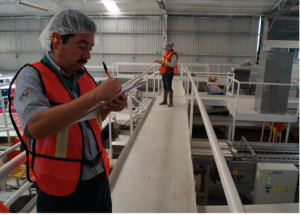Area I: Quality process system
The main foundation of the Eleven Rivers Certification Scheme (11RCS) is the quality of documentation, compliance of the established criteria, clear and complete information of processes, identification of nonconformities and correction of mistakes or deviations in the implementation of the axes of 11RCS.
The documentation of the company processes is key to deal with the challenges derived from a pollution outbreak, related to the consumption of fresh fruits and vegetables: documentation becomes the main support of the company, to respond to information requests from national authorities, and the authorities of the destination country of products.
Documentation is the group of written or graphic materials: they explain and verify the way how a process is applied, including the confirming record of the result of each of them. Documentation can be evidenced in two ways: printed and electronically.
There are different types of documentation:
- General policies and regulations: they serve for the performance of senior management, employees and people outside the company.
- Evidence: includes the record, lab analysis, photos, flowcharts, and sketches among other documentary evidence.
- Procedures: instructions explaining to employees and to those people responsible for the 11RCS implementation, how processes should be developed.
- Technical sheets: include the technical specifications from products and supplies used; the requirements and directions for use and maintenance of machinery and equipment.
- Legal: applicable regulations to the company activities and evidences of their compliance.
- General: contains relevant information, additional to the above types of documentation.
Another important subject to discuss in this axis is product traceability of human imposition, which is defined as the ability to follow the movement of a food product and its components, through the stages of production, packaging, transformation and distribution: backwards and forward.
Backward traceability is the ability of tracking a food product from store shelves, warehouses of restaurants and home storerooms, to its source of origin, going through the supply chain. On the contrary, forward traceability is the ability to trace food from the field, moving across the supply chain to the end consumer. In both situations, the potential repackaging, different storages, transport types and companies involved are identified.
Internal traceability documents the processes generated in product management, the machinery used, and temperature: all indicators that may influence the product. External traceability, instead, generates product documentation, through each link of the supply chain.



